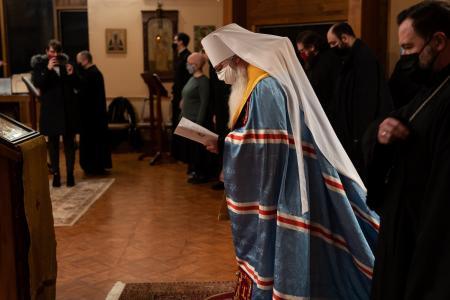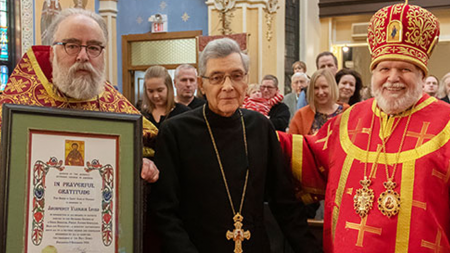38th Annual Schmemann Lecture draws hundreds to online event

On Saturday, St. Vladimir’s Seminary celebrated the patronal feast of the Seminary’s Three Hierarchs Chapel and hosted the 38th Annual Father Alexander Schmemann Memorial Lecture.
The Seminary community gathered in the morning for Divine Liturgy for the Synaxis of the Ecumenical Teachers and Hierarchs: Basil the Great, Gregory the Theologian, and John Chrysostom, patrons of the Seminary chapel. Seminary Academic Dean Dr Ionuț-Alexandru Tudorie delivered the homily, his first at Three Hierarchs Chapel.
On Saturday afternoon, New York Times bestselling author Rod Dreher delivered the 38th Annual Father Alexander Schmemann Memorial Lecture, which was held in an online format. More than 650 people participated in the online event.
Dreher’s lecture was titled “Living in Truth: How the Communist-Era Suffering Church can Prepare Us to be Dissidents.” In it, Dreher defined the challenges and explored the gifts the suffering church has for a complacent West.
"The world today either wants us to abandon Christianity, or substitute a very modern Christianity...which amounts to the same thing," said Dreher. "Parishes that live the true faith, though, will be a beacon in the night to those who long for Jesus Christ.
“These are parishes that don't give themselves over to cultural fads or to the politics of the left or the right, but seek nothing but unity with Christ—no matter what it costs."
Dreher’s talk coincided with the publication of A Voice for Our Time: Radio Liberty Talks, Vol. 1, featuring an English translation of Schmemann’s broadcasts into the Soviet Union that began in 1953. This first volume of the two-part series, being published by St. Vladimir’s Seminary (SVS) Press, features a foreword by Dreher.
-
Click HERE to preorder a copy of A Voice for Our Time

Saturday’s Schmemann Lecture and the forthcoming book are part of “The Year of Schmemann” celebrations at St. Vladimir’s. In 2021, the Seminary is honoring 100 years since the birth of Fr. Alexander Schmemann (1921-1983), its beloved former dean and renowned theologian.






